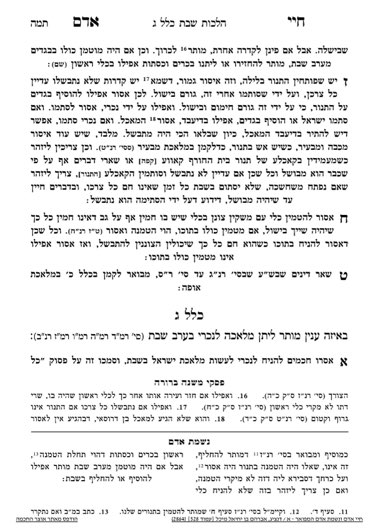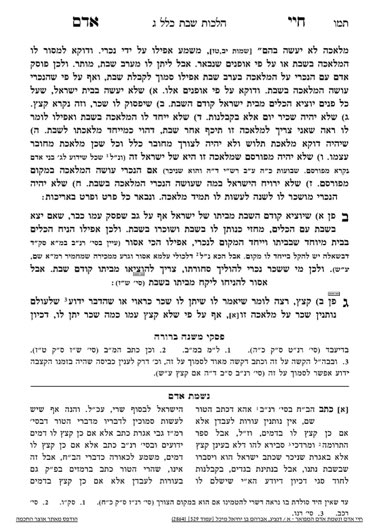We are beginning Klal 3, discussing the halachos of amira l’akum, asking a non-Jew to do work for a Jew on Shabbos. The same way the Chayei Adam divides up shehiyah and hatmana between the last Klal and discusses them again later, he will do so with amira l’akum.
We will begin with the concept behind this issur of amira l’akum. The Rambam writes (Shabbos 6:1) that it is assur to ask a non-Jew to perform melacha for a Jew on Shabbos, even though the non-Jew has no prohibitions against working on Shabbos. It is assur even if one asks the non-Jew before Shabbos to perform the melacha, and even if the Jew will not benefit from the melacha until after Shabbos. The Rambam explains that this issur is derabanan, so that Shabbos does not become light to a person. Without this issur, a person could spend all day at work directing non-Jews to perform melacha, and eventually it could lead to a person performing the melachos themselves.
Another reason why Chazal prohibited amira l’akum is as a result of the prohibition of discussing melacha on Shabbos, known as dahbeir davar. For example, a person cannot say that they plan to drive to New York after Shabbos. The person can say they plan to go to New York, because going could mean walking and does not necessarily involve melacha (and techum issues can be addressed). Similarly, one cannot discuss melacha with a non-Jew on Shabbos, such as asking a non-Jew on Shabbos if they are available to fix their plumbing during the next work week. Hence, any discussion of melacha is assur, whether the work will be done on shabbos or afterwards.
The Rambam is adding that amira l’akum includes a prohibition against asking a non-Jew even before Shabbos to perform melacha on Shabbos itself.
Chazal took this issur a step further, and said that if one transgresses amira l’akum, one cannot benefit from the melacha performed by a non-Jew. The reason behind the prohibition to derive benefit from the melacha is
- a) obviously it is inappropriate to benefit from something which is assur.
- b) to remove the motivation to transgress the issur.
- c) It also connects the Jew to the melacha performed, and how it was done specifically for a Jew, when they benefit from it.
Rashi appears to give another reason behind amira l’akum. He writes that amira l’akum is assur because of the concept of shlichus, proxy. We know throughout the Torah that a person is able to create a proxy in order to perform an action. For example, the concept of shlichus applies to a person who wishes to give a get to his wife. Even though the Torah explicitly teaches that the get must be given from husband to wife, when a person appoints a shliach, it is as though the sender themselves performed the action, and the get is valid.
Even though we know that on a Torah level, a non-Jew cannot be a halachic shliach, miderabanan, Chazal give a non-Jew the status of shliach. Thus, if one has a non-Jew perform melacha for them on Shabbos, it is as if–on a rabbanan level–they are performing the melacha themselves. Thus, according to Rashi, the issue is not about discussing something for after Shabbos, nor about discussing something for Shabbos itself.
It would appear that Rashi and the Rambam disagree regarding the reasoning behind amira l’akum; be’ezras Hashem, we will discuss this question further in the upcoming shiur.
Summary
- Amira l’akum is the issur against requesting a non-Jew to work (melacha) for a jew.
- If one requests on Shabbos itself, the reason is because one may not discuss melacha on Shabbos.
- Rambam writes the reason for the issue is so that people continue to treat Shabbos with the proper respect.
- Rashi writes the reason is because the non-Jew works as a shliach, so it is as if the Jew is performing the melacha themselves
- Chazal prohibited one from benefiting from the melacha which was done.




